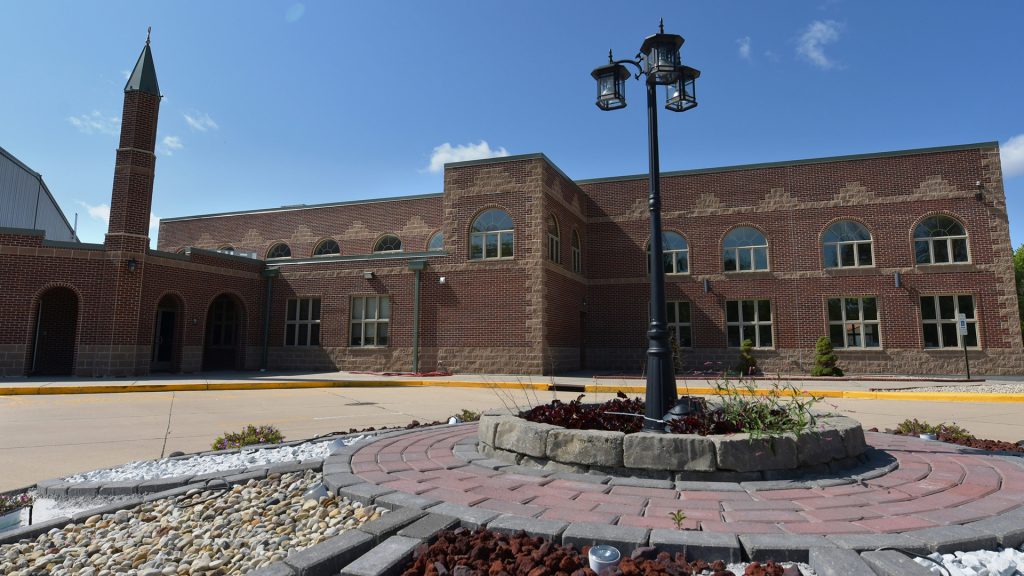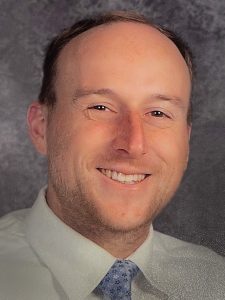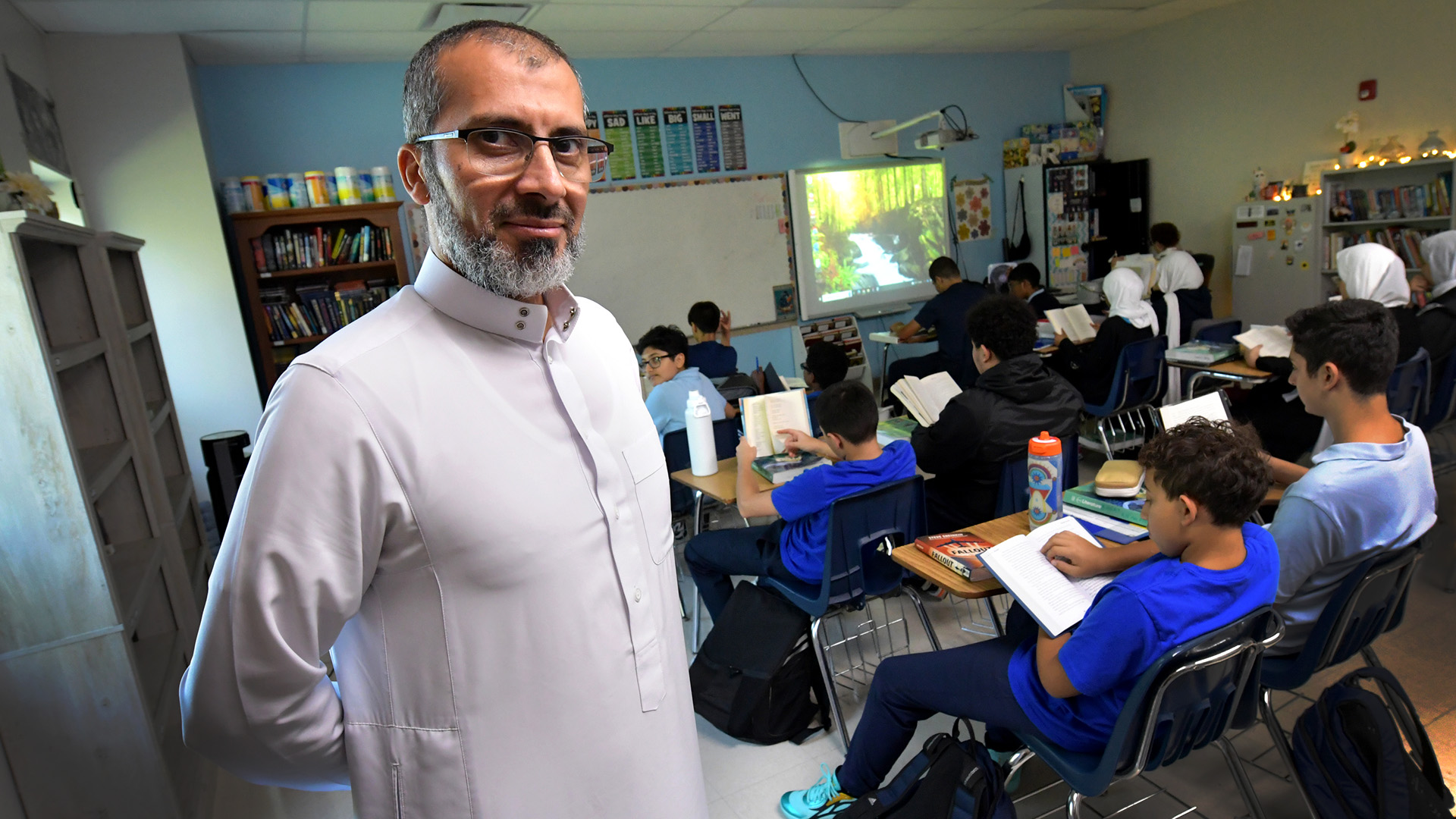‘Whatever he tells us to do, we do it,’ says the imam at Peoria’s growing Islamic Center
During a sweltering Thursday evening amid a mid-August heat wave, the Islamic Center of Peoria hummed with activity.
It was Orientation Night for the upcoming year at Daarul Uloom School, the private Islamic school housed within the Center. Parents held their children’s hands and walked through the halls, peering into classrooms and meeting their teachers.
Osama Alrefai, the Center’s imam, stood just within the front doors in the middle of the flurry. He warmly greeted parents in Arabic with an extended handshake and addressed the children by name.
It’s easy for Alrefai to spot a new family arriving at the Center, as he knows just about everyone in the community. He’s aware of at least 15 families that have moved to Peoria for their children to attend the school.
Daarul Uloom is “ranked as one of the best private schools in Peoria, if not all of Illinois,” proclaimed Alrefai, and its reputation coaxes many Muslim families to give Peoria a try.
Contributing to the foot traffic at the Center that evening were those emerging from the Quran memorization session, taught daily by Alrefai, and those concluding evening prayers from the Masjid, or mosque, the worship space also located within the building. The Islamic Center acts as a daily hub for the Muslim community of Peoria.
It has been “a fascinating journey,” Alrefai said. “I would say it was nothing short of a miracle.”
First a school, then a mosque
The origins of the Islamic Center of Peoria began in a small church building in central Peoria, across the street from Peoria High School, that was converted into a mosque in 1995.
While the modest worship space suited the community at that time, the Center’s leaders already were discussing a mosque expansion to serve the area’s Muslim youth.
Islam is a religion with a heavy emphasis on traditional family values, Alrefai explained, and that means preparing the children of the community to be highly successful individuals in adulthood — future government leaders, CEOs, entrepreneurs, etc.
“So what can we do in order for the youth to succeed? And when I say succeed, I mean secularly speaking as well as religiously,” Alrefai said. “They go hand in hand.”
Ultimately, the Islamic Center’s original location didn’t fit the ambitious concepts its leaders had in mind. In the mid-2000s, there was a significant push from a few “visionaries” to purchase a parcel of land off Charter Oak Road, said Alrefai. The Center bought the undeveloped property in Northwest Peoria in 2008 with the goal of building a school and gym, with hopes that a new mosque would soon follow.
Many at the time doubted that such a costly construction project could be pulled off, said Alrefai. But Peoria’s Muslims proved generous. The vast majority of the fundraising done on behalf of the building project came directly from the Center’s families, he said. And the giving has continued. Sometimes, a hefty bill would arrive when the Center was low on funds.
“All of the sudden, we’d get the money, and it’s just the right amount for the bill itself to be paid,” Alrefai said.
The new building housing the school and gym officially opened in late 2010, with the mosque transitioning to the space in 2015.

A large playground sits in front of the building. There’s also a garden tended by the students. The gym hosts basketball, volleyball and badminton tournaments on the weekends, drawing in teams from across the state.
As the Islamic Center’s footprint has grown, so has its membership, said Alrefai. “We were in the hundreds when we were founded, and now we’re in the thousands,” he said.
‘It’s about submitting and surrendering to the will of Allah’
— Imam Osama Alrefai
The members of the Islamic Center stretch across nearly every profession in Peoria: physicians, lawyers, engineers, business managers, sports coaches, small business owners, etc. Indeed, a number of Muslim construction engineers are helping to build the new McClugage Bridge span, said Alrefai.
The Pillars of Islam
An imam — the Muslim term for the religious leader of a mosque — is a voluntary, unpaid position. The imam’s role, said Alrefai — who otherwise works as a senior director of product engineering for a higher education consulting firm — is one of leadership and service to the community.
Alrefai said he has always gravitated toward that archetype. In the second grade, he began leading the morning assemblies at his school and later excelled in speech competitions. His father spent 38 years as a schoolteacher and principal in the country of Jordan.
“If there’s an opportunity for people to help people, you help people,” Alrefai said. “You take the initiative. That’s the upbringing my father raised us all in.”
Alrefai’s first stint as the Islamic Center of Peoria’s imam lasted from 2013 to 2017. He returned to the role earlier this year, spending from four to six hours daily at the Center joining in prayers, leading study sessions of the Muslim holy book, the Quran, and delivering a weekly sermon during the Friday prayers, which is the largest congregating day for Muslims each week.
Alrefai summarized the message of Islam as being a simple one: Muslims believe that there is no god or deity worthy of worship except Allah (God), and that the Prophet Muhammad is the final messenger of Allah.
“It’s about submitting and surrendering to the will of Allah,” Alrefai said. “Whatever he tells us to do, we do it. Whatever he tells us not to do, we don’t do it.”
That tenet marks the first of the five pillars of Islam, Alrefai explained. The other four pillars are prayer, performed five times daily; charity to the poor and needy, at 2.5% of one’s excess savings each year, if able; fasting during the month of Ramadan, from dawn to sunset; and pilgrimage, or traveling to Mecca once in a person’s life.
Finally, Muslims believe in a final judgment day, when people are judged for their actions, both good and bad.
‘Come and Learn’
Though anti-Muslim sentiment has cropped up nationally in the aftermath of the 9/11 terrorist attacks and the 2016 election, such sentiments were largely absent in central Illinois outside of a few “pockets of hostility,” according to Alrefai.
“Overall, I think the Peoria community is one of the best communities for someone to live in,” Alrefai said. “Peoria is one of the best places to raise a family.”
One high-profile exception stemmed from an incident in early 2017, when someone vandalized the Islamic Center’s roadside sign with a spray-painted numerology allegedly associated with a white supremacist group. But the defacement did not inspire fear in the Muslim community of Peoria.
“Our community was not shaken by that here,” Alrefai said.
In fact, some of those who publicly shared anti-Muslim sentiments were invited to the Center for a dinner at the mosque, emblematic of the open-door policy that Alrefai extends to the entire Peoria community.
“Come and learn about Muslims from the believers and practitioners themselves,” Alrefai said. “We’re more than happy to answer people’s questions.”





